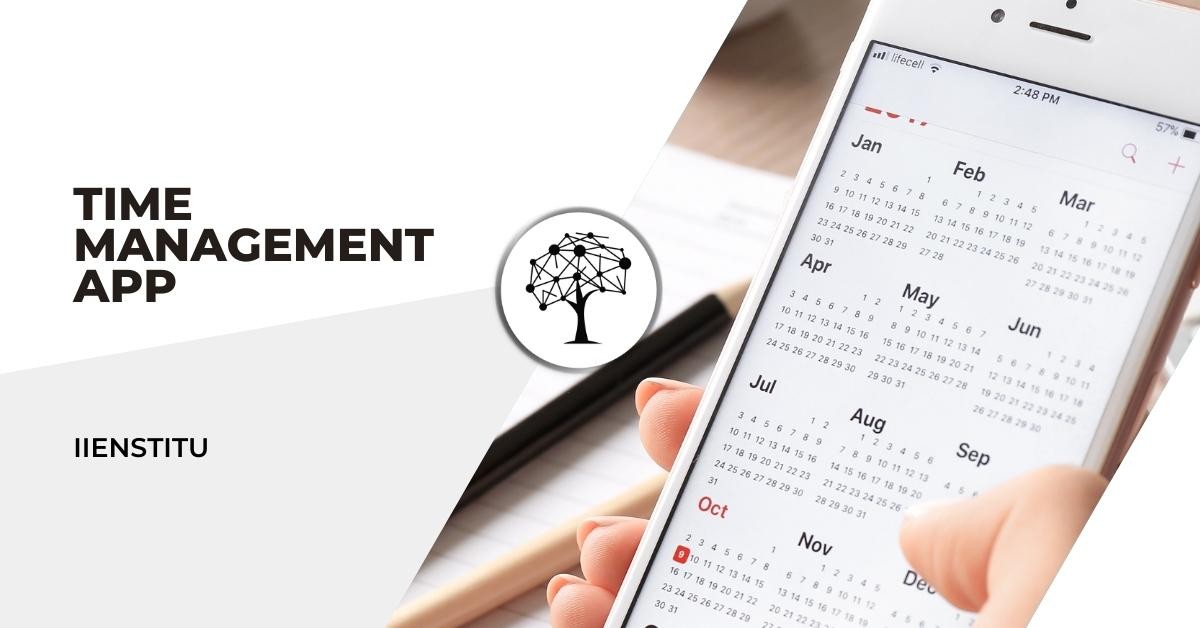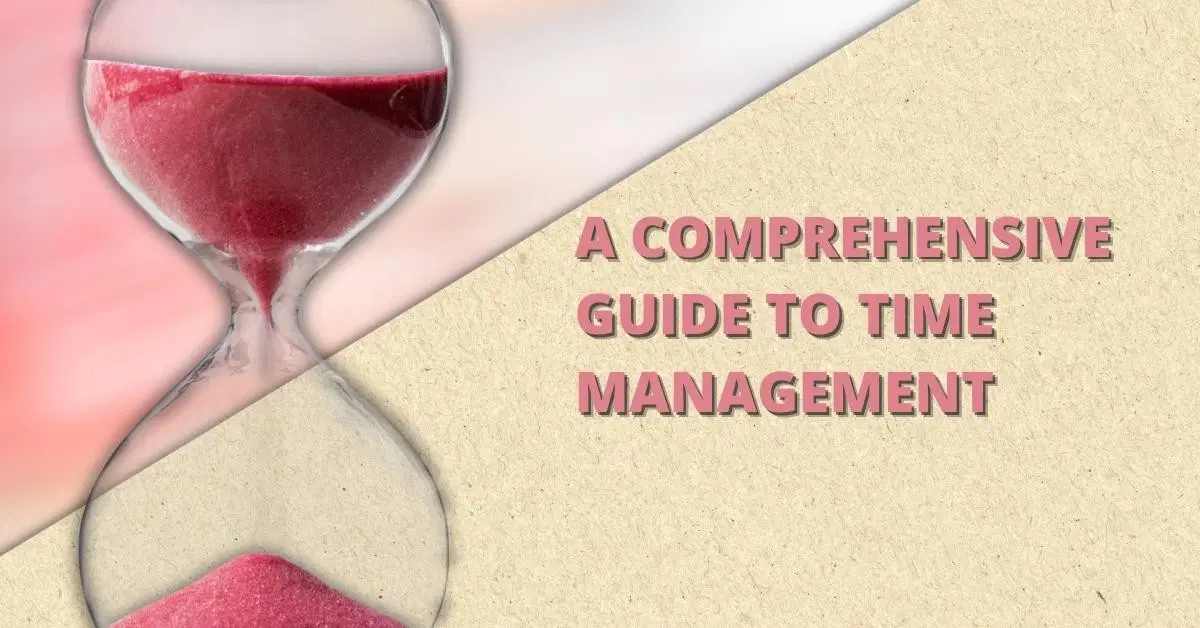
Effective time management is essential for success. It can help you meet your personal and professional goals, improve your business, and create the life you want. It’s not easy to manage time well daily, however, so these helpful tips from top experts will help you avoid common pitfalls that are often distracting and lead to poor time management. As a result, your work will get done faster and with fewer distractions.
Related Course: Time Management Online Course
The latest trends in time management have made it easier than ever for people to rise above their problems, but there's still a lot more you can do when it comes to managing your day-to-day tasks. This comprehensive guide to time management will teach you all about different ways of improving your everyday life with strategies that work best for you.
Introduction to Time Management
There are many ways to approach time management. You can also personalize your method of managing time to be effective for you.
However, a few key strategies will help you manage your time better. Let's look at these strategies and how they can improve your life.
More common time management techniques include setting goals, organizing tasks, planning, breaking down large projects into smaller tasks, prioritizing tasks, and staying motivated.
Tools and Tips for Effective Time Management
There's no such thing as a one-size-fits-all solution when it comes to time management, so it's up to you to find the right system and tools for your life.
Some of the most effective time management tips include prioritizing tasks and making routine schedules. These two steps will allow you to organize what you need to do to focus on the most important things first.
A great way to make sure your work is done quickly is by dividing it into smaller tasks that don't take too much time. This will give you more manageable chunks of work and increase overall productivity.
Another helpful tip for effective time management is keeping stress levels in check. Stress from work or other responsibilities has a significant impact on how we view our time and how efficiently we manage it. So, try incorporating short breaks throughout the day with calming or relaxing activities, which will help you decompress and feel less stressed overall.
If taking care of yourself is essential to you, consider setting specific times during your day where you'll spend some quality time doing things that make you happy. This will help keep stress levels low throughout the rest of your day without interrupting anything else going on around.
How to Negotiate with Big Businesses
Negotiation strategies are essential when it comes to your job and professional life. The ability to negotiate with big businesses can help you land a higher-paying job or even a promotion at your current one.
But it's easy if you're not sure how to do this. Just follow these steps from top experts in the field:
Establish Your Value
The first step to negotiating with Big Business is establishing your value and what you want from the negotiation. You might be thinking that dealing with big businesses isn't something that you should worry about because they're "big" and "powerful." Well, this doesn't quite hold. Companies also have needs, and they need to get those needs met just as much as you do.
So before you start negotiating with them, make sure that you understand what you want out of the negotiation. If other people ask for advice on how to deal with businesses, they'll tell you that it's all about establishing your value first and finding out what's best for them too.
How to be More Productive at Work
People have been working longer hours than ever before, which can make it hard to find the time to manage your personal and professional tasks. Luckily, there are a few ways to improve your productivity at work and make the most of your time when you're on the clock.
First, prioritize what needs to be done first. Whether you're working on a big project or something more routine, breaking it down into manageable steps makes it easier for you to complete tasks in the correct order.
Second, don't rush through tasks just because they're easy. While sometimes taking shortcuts can seem tempting, it's essential to take the time to do things right so that you'll better understand how things need to be done.
Third, stay focused on what you're doing throughout the day. Being productive doesn't mean that everything will happen quickly—it means making sure that your focus is where it needs to be and that you're not distracted by other tasks or people around you.
How to Improve Personal Relationships
Time management is also essential for your relationships, not just your professional ones. Poor time management will often lead to poor personal relationships, which can damage your mental well-being.
The first step to improving your relationships is knowing how you prioritize tasks in your day-to-day life. It's important to know what type of activities are more important than others.
If you find it hard to maintain a healthy work/life balance, it might be beneficial to separate yourself from specific tasks that take up too much time and energy; otherwise, they'll likely become distractions in both areas.
Conclusion
The article is organized into five sections:
1. Introduction to Time Management
2. Tools and Tips for Effective Time Management
3. How to Negotiate with Big Businesses
4. How to be More Productive at Work
5. How to Improve Personal Relationships

Frequently Asked Questions
Do you think we should try and balance our work and personal lives, or focus on one at a time?
The ideal would be the latter, but it's difficult these days. Our society is at a point where our ability to work has been maximized, and we need to take steps that will allow for more balance in the future. In terms of time spent between your personal life and your workmanship lifeline, it's recommended to keep them as close as possible - 2 times a day should be about right. Families have a lot of demands on them even without work being added into the mix so if you can't spend enough time with your family then you need to step away from the office until everything settles down again.
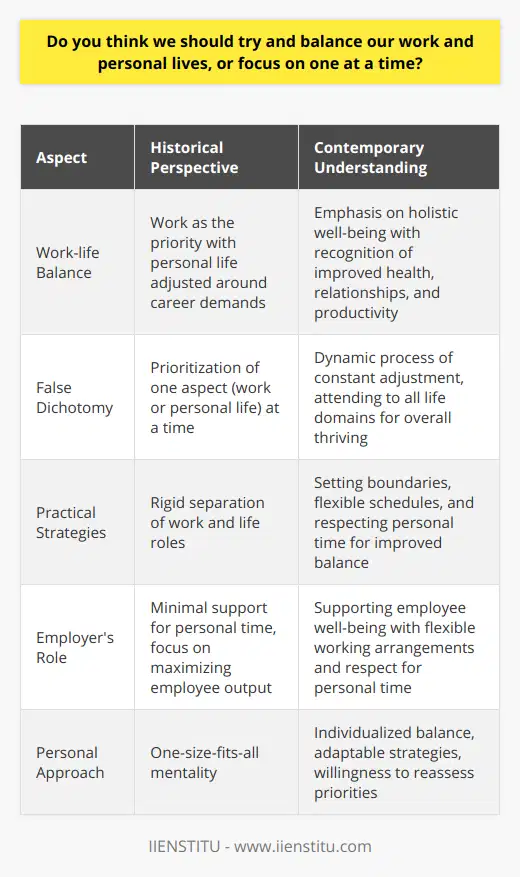
What's the best way to break bad habits like procrastination?
There are a few ways to break bad habits like procrastination. Create a new habit. Out-work the old habit by working on the new one as much as you work on the old one (actually encouraging yourself with rewards and cutting off the previous bad behavior). Remove energy vampires from your life that might be fueling your negative habits, such as unfulfilling relationships or toxic stress at work/home because these things maintain procrastination and create frustration and irritability which begats more procrastination. Have a plan to focus proactively on our goals, not passively allow thoughts about them to wander through our minds - come up with resonant phrases which can serve as an instant reminder or stimulus for action.

What are some ways you can effectively use your time?
The best way to use your time is to plan for it before you need it. This can be done in three ways, and often is all at the same time: a) Schedule blocks of time in advance on a day-to-day or week-to-week basis, so you know when things are coming up and what they'll hold in terms of commitments and deadlines b) Implement routines in your daily life that will allow you to be more proactive in anticipating potential obstacles (ie. block out some "fun" reading into each evening before bed since evenings tend to get busy with housework or cooking or whatever else may occur that prevents their getting done during the day). c) Make sure every

What are the 5 strategies of time management?
Effective Time Management Strategies
**1. Prioritization**
Prioritization involves assessing tasks based on their importance and deadlines. By identifying high-priority tasks, individuals can focus on completing the most critical work, ensuring that important objectives are met.
**2. Goal setting**
Setting clear and achievable goals can help structure time more effectively. By breaking down larger tasks into smaller, manageable steps, individuals can create a roadmap for success and prevent feeling overwhelmed.
**3. Task delegation**
Effective time management often involves delegating tasks to others. By assigning work to competent team members, individuals can focus on their own responsibilities and manage their time more efficiently.
**4. Timeboxing**
Timeboxing is a method of allocating specific time periods to tasks, with the goal of completing them within that timeframe. This technique can help maintain focus, increase productivity, and prevent procrastination.
**5. Monitored breaks**
Regular breaks can improve concentration and productivity by providing time to recharge. However, monitored breaks ensure that relaxation periods are controlled and do not negatively impact overall time management.
In conclusion, implementing these five strategies of time management can significantly improve productivity, focus, and efficiency. By prioritizing tasks, setting goals, delegating work, timeboxing, and monitoring breaks, individuals can optimize their use of time and achieve their objectives more effectively.
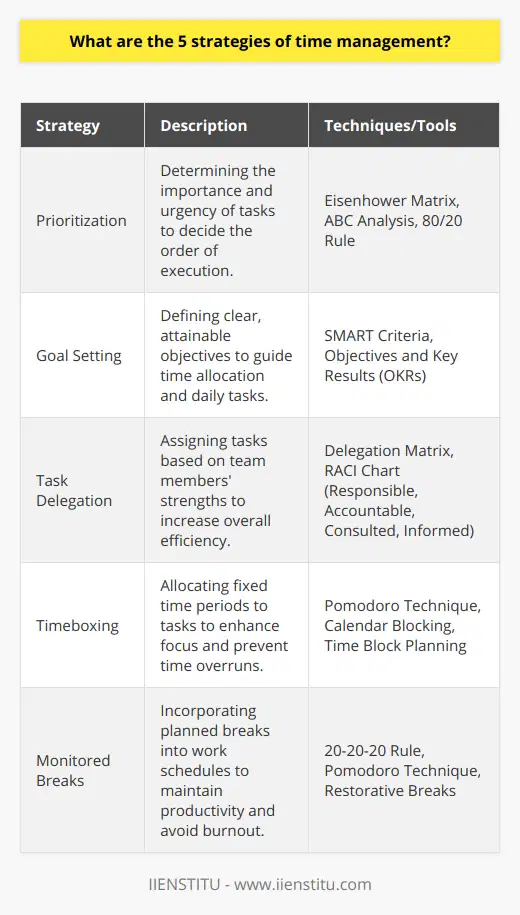
What are the 7 time management strategies?
Managing Time Effectively
Effective time management is crucial for success in various aspects of life, including academics, personal life, and work. There are seven core strategies that can be implemented to optimize the use of time and increase productivity.
Setting Priorities
Firstly, it is important to set priorities by establishing which tasks are essential and need immediate attention. By assigning tasks based on their urgency and importance, one can focus on completing tasks that matter most.
Creating a Schedule
Secondly, creating a schedule is a time-tested technique for organizing activities efficiently. Develop a daily, weekly or monthly calendar that sets designated times for task completion to avoid procrastination.
Establishing Goals
Thirdly, establishing specific, measurable, achievable, relevant, and time-bound (SMART) goals helps guide decision-making and ensures attention is directed towards activities that contribute to goal attainment.
Delegating Tasks
Fourthly, delegation is an important time management strategy for individuals who have responsibilities that can be distributed across other team members. By entrusting certain tasks to others, one can allocate time more efficiently.
Minimizing Interruptions
Fifthly, minimizing interruptions allows for focused efforts on task completion. This may involve silencing devices, closing irrelevant tabs on the computer, or setting specific hours for checking emails and responding to messages.
Developing Routine
Sixthly, creating a routine is essential for systematic task completion. Dedicate specific hours to particular activities and maintain a consistent workflow while taking breaks intermittently.
Reviewing and Adjusting
Lastly, reviewing and adjusting strategies is crucial for continuous improvement. By periodically assessing the efficacy of the implemented strategies and making necessary adjustments, one can ensure optimal time management.
In summary, time management strategies are essential to make the most efficient use of one's time. By setting priorities, creating a schedule, establishing goals, delegating tasks, minimizing interruptions, developing a routine, and reviewing and adjusting strategies, individuals can optimize their time and achieve greater success in various aspects of life.
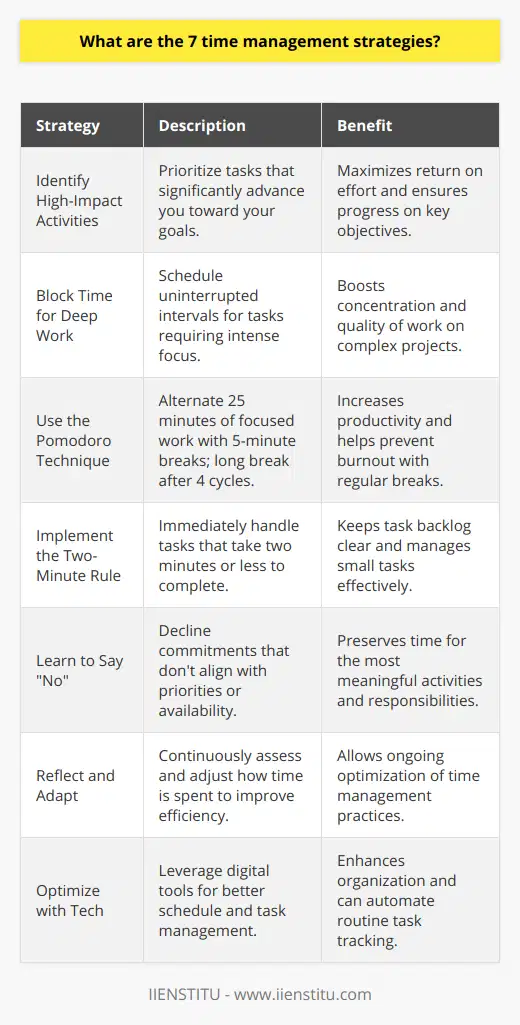
What are the 4 D's of time management?
**Defining the 4 D's**
The 4 D's of time management are essential strategies for enhancing productivity and ensuring effective allocation of time for both personal and professional undertakings. They involve prioritizing tasks, emphasizing the importance of goal-oriented time management.
**1. Delete or Discard**
The first D, 'Delete,' emphasizes the need for recognizing insignificant or non-essential tasks that provide little to no value to your goals. By identifying and eliminating such activities, an individual can reallocate their time to more meaningful endeavors.
**2. Delegate**
The second D, 'Delegate,' focuses on sharing responsibilities with others to maximize efficiency. In order to successfully delegate tasks, one must evaluate their capabilities, determine which tasks can be passed on, and trust their team members to execute them effectively.
**3. Defer or Delay**
'Defer,' the third D, encourages individuals to postpone specific tasks that are neither urgent nor critical to their objectives. This strategy not only allows for a more streamlined approach to time management but also helps prioritize more significant and pressing responsibilities.
**4. Do**
The final D, 'Do,' represents the importance of taking charge of important tasks that align with one's goals. Instead of procrastinating or delaying, this D encourages individuals to take swift and decisive action to ensure the efficient accomplishment of their objectives.
In conclusion, the 4 D's of time management provide a clear framework for prioritizing tasks and allocating time effectively. By identifying and categorizing tasks based on their significance, individuals can streamline their daily activities, enhancing productivity, and ensuring they are less overwhelmed by a myriad of tasks. Overall, adopting these strategies can lead to better time management and improved goal attainment.

What are the 6 time management strategies?
Time Management Strategies
Setting Priorities
One of the critical time management strategies is setting priorities by determining the most important tasks and focusing on their timely completion. This enables individuals to allocate their time and resources effectively, ensuring optimal productivity and success in achieving their goals.
Creating Realistic Plans
It is essential to create realistic plans for daily, weekly, and monthly activities to efficiently manage time. Developing a detailed schedule accounts for contingencies and allows individuals to allocate suitable time-slots for each task, enhancing their capacity to attain their objectives.
Delegation and Collaboration
Effective time management often involves delegation and collaboration. By entrusting appropriate tasks to team members, individuals not only streamline their work processes but also ensure shared responsibility and collective success in achieving desired outcomes.
Establishing Routines and Habits
Establishing consistent routines and habits plays a crucial role in managing time. By adopting regular patterns, individuals can optimize their day-to-day schedules, minimize distractions, and maintain momentum in accomplishing tasks.
Monitoring Progress and Self-Reflection
Periodic monitoring of progress and self-reflection allows individuals to assess their effectiveness in time management. By reviewing their performance and identifying areas for improvement, they can adjust their strategies and schedules accordingly, leading to increased productivity and goal attainment.
Employing Technology Tools
Last but not least, leveraging technology can significantly enhance time management. Tools such as digital calendars, task managers, and time tracking applications help individuals maintain control over their schedules, access crucial information, and facilitate efficient work processes.
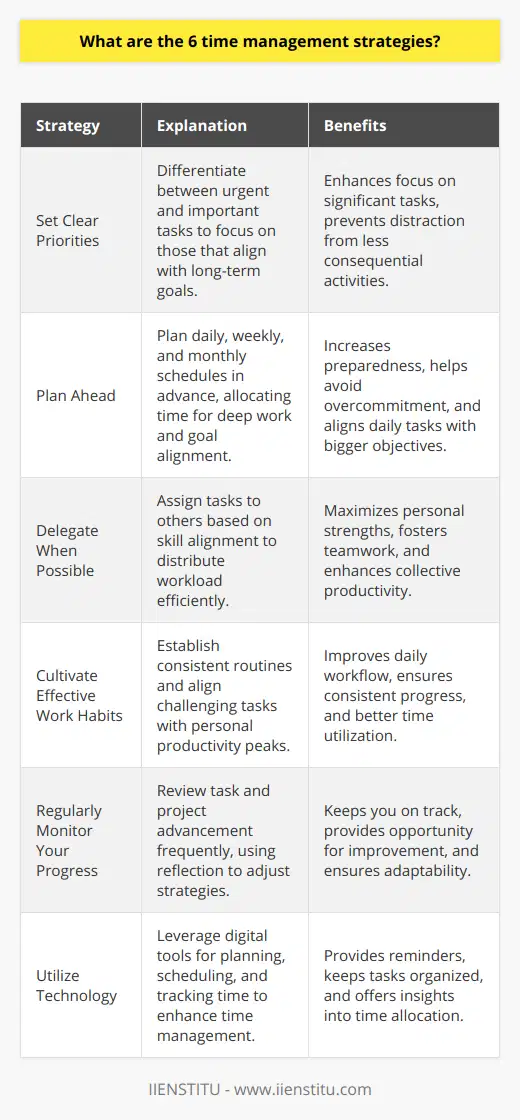
How can effective prioritization improve our time management skills?
Understanding Prioritization
Effective prioritization plays a crucial role in enhancing our time management skills, allowing us to focus on essential tasks and maximize productivity. Establishing clear priorities enables us to direct our energy towards completing urgent and important tasks, while deprioritizing less significant ones. This approach ensures we utilize our time and resources efficiently, making steady progress towards our goals.
Setting SMART Goals
To optimize our time management, setting SMART (Specific, Measurable, Achievable, Relevant, and Time-based) goals is a valuable strategy. By defining specific and measurable objectives, we can easily evaluate our progress and maintain focus on high-priority tasks. Moreover, setting achievable and relevant goals prevents us from wasting time on unrealistic or unrelated tasks, while time constraints keep us accountable and motivated.
Differentiating Urgency and Importance
An effective prioritization technique involves distinguishing between urgent and important tasks. Urgent tasks require immediate attention, while important tasks contribute significantly to our long-term goals. By categorizing tasks according to their urgency and importance, we can allocate our time effectively by addressing critical concerns first and postponing less significant ones.
Utilizing Prioritization Tools
To improve time management skills, we can employ various tools and techniques for prioritization, such as Eisenhower Matrix, ABC Method, or Ivy Lee Method. These tools enable us to systematically sort tasks based on their importance and urgency, assisting in making informed decisions regarding which tasks to undertake first. By utilizing prioritization tools, we streamline our workflow and enhance productivity.
Delegate and Collaborate
Effective time management also involves delegating tasks and collaborating with others when necessary. By entrusting tasks to others, we can focus on completing high-priority tasks without becoming overwhelmed. Collaborating with others enables us to pool resources, share diverse skill sets, and capitalize on collective intelligence, ultimately improving efficiency and productivity.
In conclusion, effective prioritization is fundamental to improving our time management skills. By setting SMART goals, differentiating between urgent and important tasks, utilizing prioritization tools, and collaborating with others, we can make substantial progress in managing our time efficiently and attaining our goals.

In what ways do the 4 D's of time management enhance our productivity and efficiency?
Defining Priorities
The 4 D's of time management – delete, delegate, defer, and do – significantly improve our productivity and efficiency by streamlining tasks and ensuring effective allocation of resources. Firstly, identifying what tasks can be deleted allows us to eliminate unimportant or redundant activities. This decluttering process ensures that our time and focus remain geared toward activities with higher priority and value, thereby promoting productivity.
Allocation of Tasks
Secondly, delegating tasks to team members or colleagues can distribute workload effectively, enabling a more focused approach to each assignment. Delegation not only saves time by avoiding task duplication but also promotes collaboration and accountability within teams. When tasks are correctly delegated, individuals can work more efficiently, contributing to a heightened collective performance.
Scheduling Workload
Thirdly, the defer aspect of time management involves rescheduling the tasks that do not require immediate attention or do not directly contribute to achieving our goals. By deferring tasks, we create a structured plan prioritizing the order in which tasks are addressed, improving efficiency and minimizing distractions. Moreover, deferring non-urgent tasks reduces the risk of multitasking, further enhancing our ability to complete tasks effectively.
Immediate Action
Lastly, the 'do' component of the 4 D's indicates that one should tackle high-priority and time-sensitive tasks without delay. By promptly addressing critical assignments, we efficiently allocate time and resources, ensuring the timely completion of projects. Swift action also minimizes the risk of procrastination and reinforces the importance of focusing on goal-oriented activities.
In summary, the 4 D's of time management support increased productivity and efficiency by defining priorities, effectively allocating tasks, scheduling workload, and promoting immediate action. By adopting these principles, individuals and teams can effectively manage their time, ultimately leading to higher productivity and better overall performance.
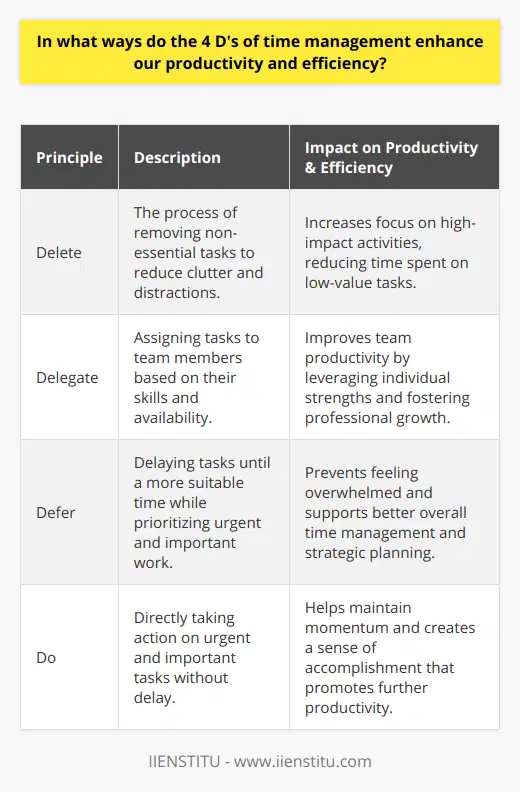
What are the 4 P's of time management?
The Four Dimensions of Time Management
Prioritizing Tasks
One of the four P's of time management is prioritizing, which involves deciding the order in which tasks will be completed based on their significance and urgency. Prioritizing is important, as it ensures that crucial tasks are dealt with before less important ones, reducing stress and maximizing productivity.
Planning and Scheduling
Another essential aspect of time management is planning, which involves creating a strategy to complete tasks within a given timeframe. This includes determining objectives, dividing them into smaller steps, and setting deadlines for each step. Successful planning requires clear goals, awareness of one's limitations, and a commitment to being realistic. Scheduling refers to organizing one's daily, weekly, or monthly calendar, allocating specific timeblocks for various tasks. A well-designed schedule allows for the efficient use of time, minimizing distractions and ensuring the completion of both important and routine tasks.
Preventing Procrastination
The third dimension of time management is preventing procrastination—postponing or delaying tasks. This can lead to wasted time, increased stress, and poor-quality work. To counteract procrastination, individuals can employ various strategies such as setting smaller goals, breaking tasks into manageable steps, and assigning deadlines. Additionally, understanding one's workload can help in identifying and eliminating unnecessary tasks, streamlining the work process, and making it easier to focus on essential tasks.
Productive Work Sessions
The fourth P of time management is productive work sessions, ensuring that time spent working is efficient and effective. This involves concentration and prioritization, minimizing interruptions, and eliminating distractions. Techniques to enhance productivity during work sessions can include planning a designated workspace, using time management tools such as timers and calendars, and taking regular breaks to prevent burnout and maintain focus.
In conclusion, the four P's of time management—prioritizing, planning and scheduling, preventing procrastination, and productive work sessions—can contribute significantly to individuals' productivity and effectiveness, making the most of their available time. Incorporating these strategies into daily routines can lead to reduced stress, improved work quality, and increased success in personal and professional endeavors.
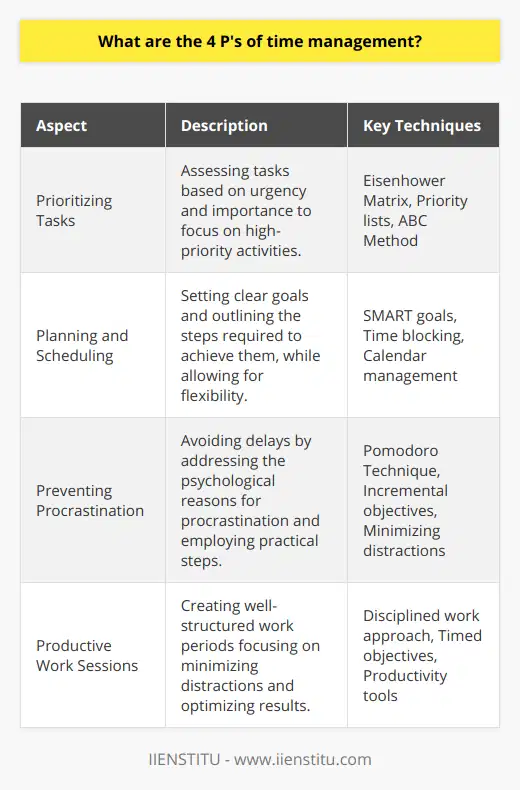
What are 8 time management strategies?
**Prioritize Tasks**
Time management starts with prioritizing tasks. Determine which tasks are most important, and assign a level of urgency to each task based on its significance. This will help you allocate your time more effectively.
**Set Goals**
Establish short-term and long-term goals to help you focus on the bigger picture. By setting specific, measurable, attainable, relevant, and time-bound (SMART) goals, you can track your progress and stay motivated.
**Create a To-Do List**
Write down all the tasks requiring your attention and break them down into smaller, manageable steps. Review your list daily, allocating specific time slots for each task and updating your list as you complete items.
**Implement a Schedule**
Create a daily, weekly, or monthly schedule to ensure you allocate enough time for crucial tasks. Ensure your schedule is flexible enough to allow for unexpected events and interruptions.
**Avoid Procrastination**
Procrastination leads to wasted time. Stay disciplined and work on tasks according to your schedule. Minimize distractions such as unnecessary browsing on the internet and excessive social media use.
**Delegate Duties**
When possible, delegate tasks to others to reduce your workload. By recognizing and utilizing the strengths of your team members, you can allocate tasks more efficiently and increase productivity.
**Organize your Workspace**
A clutter-free environment facilitates productivity, as it reduces distractions. Keeping your workspace organized promotes mental clarity, allowing you to focus better on your tasks and efficiently manage your time.
**Take Breaks**
Regular breaks are essential for maintaining focus and reducing stress. As you manage your schedule, allocate time for short breaks throughout the day. This will help prevent burnout and maintain your overall physical and mental well-being.
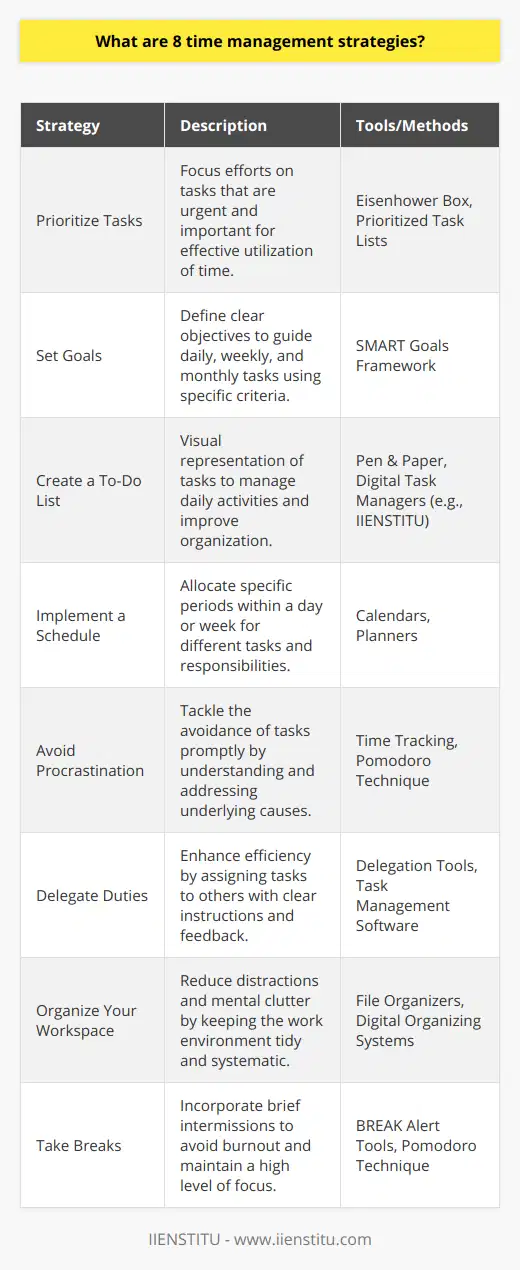
How can the implementation of time management strategies contribute to overall well-being and success in various aspects of life?
Time Management Benefits
Implementing time management strategies plays a crucial role in enhancing overall well-being and success in different aspects of life. Efficiently managing time enables individuals to prioritize activities and tasks, allowing them to focus on crucial objectives and complete them successfully.
Reducing Stress Levels
When people efficiently manage their time, they can avoid the stress caused by last-minute deadlines and unfulfilled responsibilities. Stress reduction is key to maintaining one's mental health and improving overall well-being. Planning and organizing one's schedule can lead to more predictable workloads, allowing individuals to avoid distress and maintain a balanced lifestyle.
Enhancing Productivity
Time management strategies help individuals allocate appropriate time to complete tasks, leading to increased productivity. By setting realistic goals and prioritizing actions, individuals can allocate time effectively, resulting in the timely accomplishment of objectives. Higher productivity levels often translate to personal and professional success, benefiting various aspects of life.
Improving Decision-making Skills
One's ability to make wise decisions can be significantly influenced by the implementation of time management strategies. With a well-structured schedule, individuals can gain a better overview of pending tasks and can allocate time to make informed decisions. Proper decision-making skills are essential for success in personal and professional life, with time management playing a pivotal role in developing such skills.
Creating a Healthy Work-life Balance
Managing time effectively allows individuals to maintain a healthy work-life balance, a crucial element to overall well-being. Through time management strategies, one can allocate adequate time for personal and work-related activities, ensuring neither responsibility is neglected. By setting healthy boundaries, people can achieve overall success in various aspects of life while maintaining their well-being.
In conclusion, implementing time management strategies positively impacts overall well-being and success in diverse aspects of life, by reducing stress levels, enhancing productivity, improving decision-making skills, and creating a healthy work-life balance. Individuals who prioritize and manage time effectively are better equipped to handle life's challenges, leading to a more fulfilling and successful life.

What are the 5 strategies of time management?
Effective Time Management Strategies
One crucial strategy for time management is prioritization. Order tasks according to their urgency and importance, focusing on high-priority items first, before tackling the less urgent tasks.
Another strategy involves planning and scheduling. Develop a realistic timeline for your tasks, allocating enough time for each activity and incorporating breaks to prevent burnout.
Thirdly, delegation is pivotal in time management, especially in a team setting. Assign tasks to team members based on their skills and capabilities to ensure tasks get handled effectively and efficiently.
Setting clear goals is also a vital time management strategy. Clearly defined objectives provide a clear focus and guideline on what to achieve, which reduces time wasted on non-essential activities.
Finally, maintaining a healthy work-life balance is essential for effective time management. Efficiently manage your professional and personal life to prevent overworking, thus promoting wellness and productivity in both aspects.
In a nutshell, time management strategies such as prioritization, planning and scheduling, delegation, goal setting, and maintaining work-life balance can significantly enhance productivity and efficiency.

What are 4 examples of time management strategies?
Effective Time Management Strategies
Effective prioritizing is fundamental in time management. Prioritizing tasks allows for a better distribution of time, ensuring pressing assignments receive suitable attention.
Adopting the Eisenhower Method
The Eisenhower Method can help in effective prioritization. This strategy involves categorizing tasks based on their urgency and importance. This division can aid in focusing more on critical assignments and delegate or postpone less significant ones.
Taking advantage of Time Blocking
The Time Blocking technique enhances concentration and diminishes interruption. This involves dividing the day into specific blocks assigned solely to complete an activity or task. It helps in reducing the likelihood of overestimation or underestimation of task completion time.
Implementing the Pomodoro Technique
Another effective tool is the Pomodoro Technique. For efficiency, this technique necessitates working for a set amount of time, typically 25 minutes, followed by a short break. Regular intervals help in maintaining productivity levels and avoiding burnout.
Applying the 80/20 rule
Lastly, the 80/20 rule, also known as the Pareto Principle, can be used. This principle implies that 20% of the effort leads to 80% of the results. Identifying and concentrating on the important 20% can greatly aid in enhancing time efficiency.
These various techniques not only assist in allocating time effectively but can also lead to an increase in productivity and overall life quality.
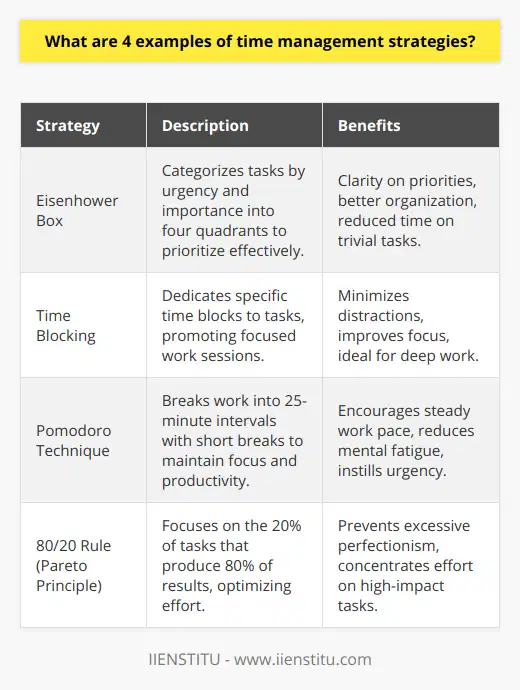
What are 8 time management strategies?
Managing time effectively demands the application of a range of strategies. The first is prioritizing tasks; Pivotal tasks should sit high on the priority list. Second, setting realistic goals is beneficial; Goals should align with the time, resources and capabilities available.
The third strategy is delegation which involves passing tasks to capable hands to save time. A fourth strategy consists of breaking large tasks into smaller, manageable parts, enabling a steady progress. A fifth approach involves allocating specific time slots for tasks, ensuring tasks suit the time assigned.
The sixth strategy is minimizing distractions; such as turning off mobile devices or digital notifications during dedicated work periods. The seventh relates to the use of tools; productivity and scheduling tools can make time management more efficient. The eighth and final strategy is maintaining a healthy lifestyle. Balanced nutrition, regular exercise, and sufficient rest can enhance cognitive functions, thus improving productivity and resourceful use of time.
In conclusion, various strategies- prioritizing, setting realistic goals, delegation, breaking tasks down, time allocation, minimizing distractions, using appropriate tools, and maintaining a healthy lifestyle- can be employed to improve time management. All these strategies simultaneously contribute to better organization, resulting in effective time management.


